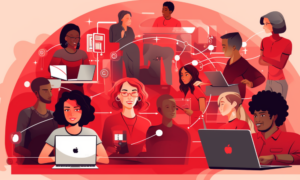How does digital transformation translate to workplace culture?
- 4 Min Read
A study carried out by AVADO has shed some light on an important question: how digital transformation and skills impact a workplace’s culture and processes.
- Author: HRD Connect
- Date published: Jan 26, 2017
- Categories

In association with AVADO.
Digital transformation is a pressing issue at the top of the agenda for organisations, demanding questions such as how best to prepare, how to undergo it successfully, and how it will impact resources and revenue.
A study carried out by AVADO has shed some light on another important question: how digital transformation and skills impact a workplace’s culture and processes. It found that workplaces with systems in place to quickly upskill their existing employees with the additional digital capabilities they might need are far more likely to use digital tools and processes, and also to employ collaborative working methods in their day-to-day activities.
But 43% of the more than 250 businesses surveyed by AVADO in The Digiskills Report did not have a way to quickly upskill their existing talent with additional digital skills, a situation which can result in higher staff turnover and cost, waning employee motivation, and a loss of business as organisations struggle to compete with more digitally capable competitors.
So just how prevalent were digital skills and processes amongst the businesses that AVADO surveyed, and what can organisations do to improve their track record in this regard?
Talent, culture and change
Organisations were asked to rate how strongly they agreed with the following statement: “We have a way to quickly upskill (enough of) our existing talent with the additional skills we need.”
Just 22% of organisations believed in their ability to upskill their existing talent – less than a quarter of businesses surveyed. By contrast, 33% of respondents disagreed with the statement, whilst a further 10% strongly disagreed.
The survey data further revealed a strong link between organisations who are able to quickly upskill their existing talent and those who make use of collaborative and digital tools and processes. For example, 74% of those who are in a position to digitally upskill their employees make use of document co-editing, whereas 84% of those who are not in a position to digitally upskill do not. Similarly, 70% of organisations with the ability to digitally upskill make use of file sharing, versus 75% of those who are not able to upskill, who do not.
More than half of organisations who are able to digitally upskill their workforce (56%) employ multi-location meetings, whereas 88% of those who are unable to digitally upskill do not. Additionally, 41% of organisations with the ability to digitally upskill make use of project team collaboration as a way of working, whereas 54% of those unable to digitally upskill their workforce do not.
Digital all-rounders
Even amongst the relatively small portion of organisations (22%) who have systems in place to digitally upskill their existing talent, the correlation is clear. Businesses who have put in place an infrastructure that allows them to bring their employees up to speed on digital are also clearly in a better position to use tools that promote co-operation and flexible working.
The findings reinforce the importance of relevant digital training – not just from a perspective of having a digitally capable workforce, but because of the benefits that this brings to all areas of the company, ushering in more modern ways of working and a digital-first culture.
Therefore, whilst the best solution to equipping your workforce with the digital skills they need may seem to be recruiting experts externally, there is also a strong argument to be made for training and upskilling your existing workforce instead, as this can bring other benefits in terms of workplace culture and innovative working methods, which will put the company in a stronger position over the long term.
But how should companies go about this upskilling? Shevaun Haviland, Founding Director of the ADBL, writes in the AVADO Digiskills Report:
“To successfully upskill staff for the digital present and future, learning programmes must align with agile principles. Continual reassessment of learning content in order to reflect both evolving surroundings and the learners themselves is essential to keep pace and ensure relevant skills.
For digital upskilling to gain traction throughout an organisation, those with learning and development responsibility need to ‘light some fires’: find pockets of influencers and give them the digital training the entire organisation is in need of. This will spread the word, and attract further handraisers, increasing demand for digital skills development organically.”
For more insights into the impact of digital transformation on businesses, and to benchmark your organisation’s digital capability against the wider industry, click here to download the AVADO Digiskills Report.
Sponsored content produced in association with AVADO. Click here to learn how to promote your business on HRD Connect.









